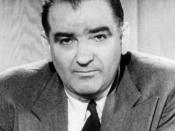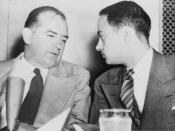Fahrenheit 451
Fahrenheit 451 by Ray Bradbury is an allegory. The plot of the book relates to censorship in the real world. Throughout history, almost all means of expression have been censored at different points in time. From books to radio to TV, there have always been steady influences of powerful bodies denying the public of points of view that conflict with its ideals or argue with its form of leadership.
In the case of Fahrenheit 451, if people keep books, they are considered criminals and are inappropriately punished. They are sent to jail, and their houses are set on fire to burn all of the books inside. The entirety of the book takes place in the future and almost all houses have been covered with a flame prevention layer so the frame of the house is not burnt, just all of its contents. The men who carry out this job are called "firemen".
Unlike today's firemen, instead of putting out fires, they start them.
At the time of the beginning of the story, there are very few books remaining in the country. So few books exist that almost no one has ever read the Bible and some have never even even heard of it. The protagonist of Fahrenheit 451 is named Guy Montag. He is a fireman. He takes great joy in his duties. However, unlike all the other firemen in the local firehouse, he also realizes that on the whole, he is not happy with his life. He meets a younger girl named Clarisse who lives across the street. He is astounded by the way she acts. As opposed to going to school and asking "What?" to the teachers, she asks "Why?" After meeting Clarisse, Guy begins to question censorship and the work that the firemen perform.


